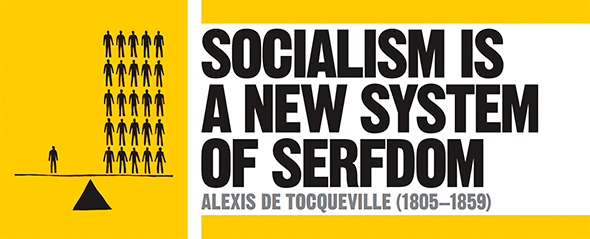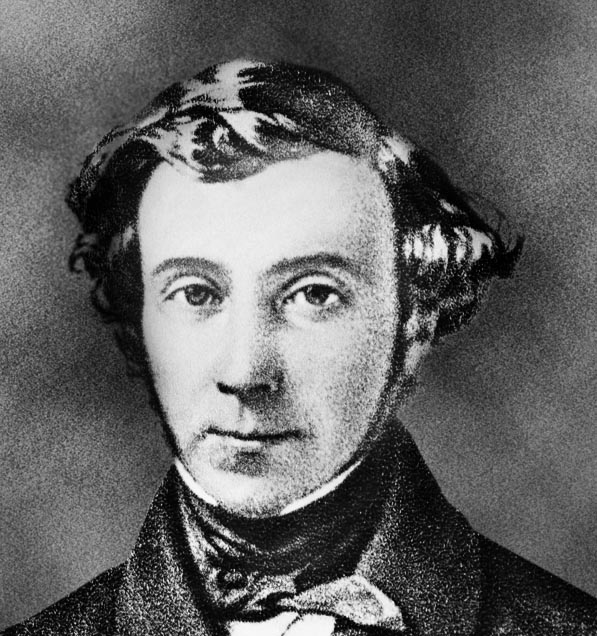
IN CONTEXT
Liberalism
Classless society
380 BCE Plato argues that democracy is inferior to other forms of government.
1798 The French Revolution begins, leading to the establishment of a republic.
1817 Socialist theorist Henri de Saint-Simon argues for a new type of society based entirely on socialist principles.
1922 The Soviet Union is established, bringing communist rule to much of Eastern Europe.
1989 The Berlin Wall falls, heralding the end of socialism throughout Eastern Europe and the increased expansion of capitalist, democratic systems of government.
In September 1848, Alexis de Tocqueville made an impassioned speech in France’s Constituent Assembly, which had been elected after the overthrow of King Louis-Philippe that February. He argued that the ideals of the French Revolution of 1789 implied a democratic future for France and a rejection of socialism.

De Tocqueville attacked socialism on three counts. First, he argued that socialism plays on “men’s material passions”—its aim is the generation of wealth. It ignores the loftiest human ideals of generosity and virtue, which were the seeds of the revolution. Second, socialism undermines the principle of private property, which he saw as vital to liberty. Even if socialist states do not seize property, they weaken it. Finally, his strongest criticism was that socialism is contemptuous of the individual.
Under socialism, de Tocqueville believed, individual initiative is snuffed out by an overbearing state. The state directs society as a whole, but increasingly becomes the “master of each man.” While democracy enhances personal autonomy, socialism reduces it. Socialism and democracy can never go together—they are opposites.
A classless society
De Tocqueville believed that the ideals of the French Revolution had been betrayed. The revolution of 1789 was about liberty for all, which meant the abolition of class divisions. But since then, the upper classes had become more privileged and corrupt. The lower classes burned with anger and disaffection, and were therefore more easily seduced by socialist ideas.
"Democracy aims at equality in liberty. Socialism desires equality in constraint and in servitude."
Alexis de Tocqueville
The solution, de Tocqueville claimed, was not to be found in socialism, but in a reassertion of the original revolutionary ideal of a free, classless society. Socialism, by pitting property owners against the proletariat, would reinstate social divisions, betraying this vision. The establishment of a socialist system would be like reverting to the pre-revolutionary monarchy. The domineering socialist state was, for de Tocqueville, incompatible with freedom and competition.
De Tocqueville espoused a democratic society in which individual enterprise could flourish, but the poor and vulnerable would be protected through the Christian ideal of charity. As a model for this he pointed to the US, which he believed had achieved the most advanced version of democracy.
De Tocqueville’s contrast between democracy-as-freedom and socialism-as-confinement became a recurring motif in 19th- and 20th-century debates. His speech was made in a year in which revolutions and uprisings spread across Europe, fomented in part by socialist ideas. However, after 1848, the uprisings fizzled out, and for a time, socialism failed to take root in the way he had feared.

Under socialism, de Tocqueville argued, workers would be mere cogs in the overbearing machinery of the state.
ALEXIS DE TOCQUEVILLE

De Tocqueville was born in Paris to aristocratic parents. When Louis-Philippe d’Orléans came to the throne in 1830, de Tocqueville took up a post in the new government, but political changes made his position precarious so he left France for the US. The result was his most famous work, Democracy in America, in which he argued that democracy and equality had progressed furthest in the US. He also warned of the dangers of democracy—materialism and excessive individualism.
After the 1848 revolution de Tocqueville became a member of the Constituent Assembly in France, which was responsible for devising the constitution of the Second Republic. He withdrew from politics after his opposition to Louis-Napoléon Bonaparte’s coup of 1851 led to a night in prison. Dogged by ill health for much of his life, he died of tuberculosis eight years later aged 53.
Key works
1835, 1840 Democracy in America
1856 The Old Regime and the Revolution
See also: Plato • Aristotle • Montesquieu • Jean-Jacques Rousseau • John Stuart Mill • Max Weber
